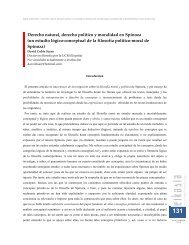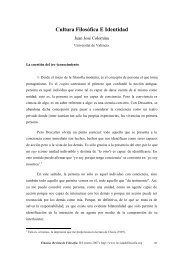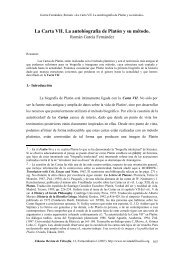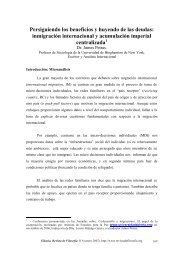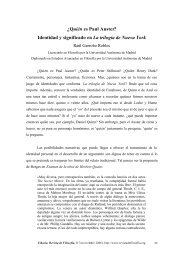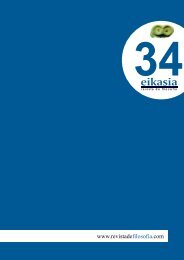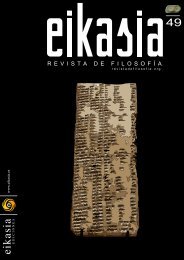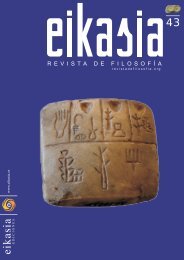Descargar número completo (3,83 MB) - Eikasia
Descargar número completo (3,83 MB) - Eikasia
Descargar número completo (3,83 MB) - Eikasia
You also want an ePaper? Increase the reach of your titles
YUMPU automatically turns print PDFs into web optimized ePapers that Google loves.
«Seminario Loyola - Gracián»<br />
practical terms to the demands of the situation, not for the sake of moralist advantage,<br />
but rather for the sake of a better and more faithful fulfillment of the truth. Whatever the<br />
case, relational autonomy constitutes, in my opinion, the core of Jesuit modernity, and<br />
perhaps, in different forms, of every other modernity, including our own<br />
archimodernity. One wonders what Machiavelli would have thought of it, provided, of<br />
course, that it was not Machiavelli’s dominant thought.<br />
This notion of relational autonomy sends us back to the problem raised by<br />
Antonio Rivera: is the autonomy of the political an essential, or even the essential mark<br />
of modernity? Fredric Jameson has noted of contemporary critical discourse on the<br />
political that it ends up devolving “into ethical, theological, and civic republican motifs<br />
(...) For the Left, the present conceivability of any strategic orientation to state power<br />
has arguably imparted an abstract character to its various affirmations of ‘the political’<br />
as an agenda in its own right.” If we are to engage today “the problematic status of the<br />
semantics of decision, commitment, and denunciation,” and address “the question of<br />
what constitutes the specifically political dimension . . . and whether this can be<br />
distinguished from mere partisan ideology” (Jameson), we must come to terms, I<br />
believe, with Jesuit relational autonomy. This is, incidentally, the question that Naoki<br />
Sakai’s Translation and Subjectivity leaves with me.<br />
Could any possible primacy of politics over history (including economic history)<br />
be considered absolute or relative? If relative, then politics would still be subordinate to<br />
history in the last instance. If absolute, then politics would be the norm of action. But an<br />
absolutely primary politics would have to rely on the total immanence of its own<br />
conditions, and would in fact be normless. A politics without a norm that it, a politics<br />
that would itself be the normative standard, without recourse to alterity or to a<br />
heterogeneous grounding, can only be a politics of force. As such, it would have<br />
become ontology (as in the Nietzschean case).<br />
The alternative to an ontology of force (which would in itself create a paradox:<br />
would politics then reach full autonomy to the very extent that politics becomes<br />
ontology, and thus something other than itself?) is to think that a norm for politics can<br />
<strong>Eikasia</strong>. Revista de Filosofía, año VI, 37 (marzo 2011). http://www.revistadefilosofia.com 23






